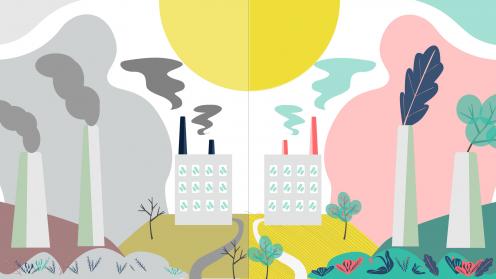The first of two Energy Action Days leading up to the High-level Dialogue on Energy (HLDE) convened virtually on Wednesday, 22 September, under the overarching theme “The Power of SDG 7 to Create a Better Future for People and Planet.” After opening keynote addresses, the Action Day featured two panels focused on two of the five themes of the global roadmap to be presented to the HLDE: “energy access” and “role of energy in advancing a just and inclusive energy transition.” The highlight of the day, however, was a series of announcements of voluntary commitments known as “Energy Compacts” on transformative action toward achievement of Sustainable Development Goal 7 (SDG 7) on clean, affordable energy for all by 2030 and achieving net zero emissions by 2050.
Damilola Ogunbiyi, CEO and Special Representative of the UN Secretary-General for Sustainable Energy for All and Co-Chair of UN-Energy, delivered opening remarks, calling energy “a golden thread” to deliver on both domestic and global development and climate priorities and urging bold action.
In a special keynote, UN Deputy Secretary-General Amina J. Mohammed noted that achieving SDG 7 is crucial for meeting the 2050 net zero emissions goal and declared “failure is not an option.” She called for using the HLDE to create a just and equitable energy transition for all and for future generations.
In other keynotes, Alok Sharma, President of the 26th meeting of the Conference of the Parties (COP 26) to the UN Framework Convention on Climate Change, said clean energy was key to keeping the 1.5˚Celsius limit on global temperature rise, and that support for coal-fired power is “going up in smoke.” European Commissioner Frans Timmermanns called for countries to stop funding overseas coal power and phase out existing coal plants. Vera Songwe, Executive Secretary, UN Economic Commission for Africa, said sustainable energy is crucial for realizing the vision of the African Continental Free Trade Area agreement. Nisreen Elsaim, Chair, UN Secretary-General's Youth Advisory Group on Climate Change, said the climate cannot wait until 2050 for neutrality, and realizing development and climate goals demands massive investment in renewable energy so youth have a future to build on.
UN Development Programme (UNDP) Associate Administrator Usha Rao-Monari moderated a panel on financing the off-grid opportunity. Barbados discussed its effort to achieve 100% renewable energy by 2030. Nithio outlined its efforts to use artificial intelligence to improve understanding of credit risks and differentiate which projects can use commercial loans vs. grants or concessional loans. SunFunder described its efforts to provide blended funding for solar enterprises in Africa. The Green Climate Fund described its efforts to fund disruptive technologies and innovative solutions, especially in least developed countries and small island developing states.
Jason Bordoff, Co-Founding Dean, Columbia Climate School, moderated a panel on advancing a just and inclusive energy transition that also addresses achieving universal energy access. The Clean Cooking Alliance discussed how important clean cooking is to meeting health, development, energy, and inclusion goals even though often overlooked in planning stages. The Rocky Mountain Institute noted that while renewable energy costs have plummeted, capital costs of installation are still high, investment is not meeting the scale needed, and finance is poorly organized. The International Trade Union Confederation said that, if done right, a just transition to decarbonized energy would be a significant jobs generator and build energy security and resilience.
Among the Energy Compacts announced on Wednesday:
- the Inter-American Development Bank announced the Renewable Energy for Latin America and the Caribbean (RELAC) compact, which sets the regional goal of 70% renewable energies participation in installed capacity and electricity generation;
- Iceland and UN-Women announced a Gender and Energy compact to catalyze action towards giving women an equal opportunity to lead, participate in, and benefit from a just, sustainable and inclusive energy transition;
- India's largest utility, NTPC, committed to install 50+ gigawatts (GW) renewable energy capacity by 2030 and reduce its net energy intensity;
- TotalEnergies committed to install 100 GW gross capacity of renewable energy by 2030, providing sustainable electricity to about 80 million people;
- Energias de Portugal (EDP) pledged to be coal-free by 2025, and to be green and carbon neutral by 2030;
- Power Africa announced a multi-stakeholder compact to provide 25,000 health facilities in Sub-Saharan Africa and South Asia with sustainable access to a clean and reliable power source;
- the International Renewable Energy Agency (IRENA) announced a Multi-Stakeholder Green Hydrogen initiative, currently bringing together 29 compacts, with more expected later, for 268 GW of new renewable energy capacity by 2030 and more than 25 million tonnes of green hydrogen;
- the European Bank for Reconstruction and Development (EBRD) committed to produce 50 Green City Action Plans by 2023, and around EUR 1.9 billion in Green Cities priority investments;
- the Global Wind Energy Council (GWEC) announced a compact with IRENA to increase offshore wind power to 380 GW by 2030 and 2,000 GW by 2050;
- Royal Dutch Shell committed to net zero emissions by 2050 and to provide reliable electricity to 100 million people in emerging markets by 2030; and
- Sierra Leone announced a Cleaner Cooking Compact.
For more details on these Energy Compacts, please consult the Energy Compact Registry at https://www.un.org/en/energycompacts/page/registry
To receive free coverage of global environmental events delivered to your inbox, subscribe to the ENB Update newsletter.









